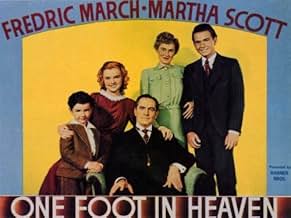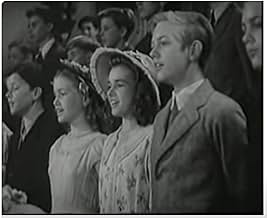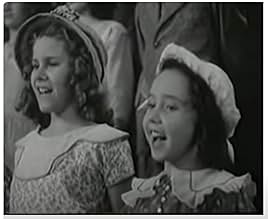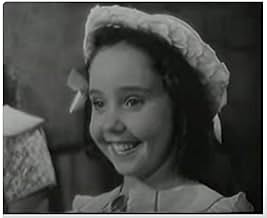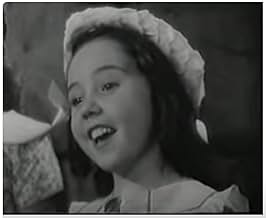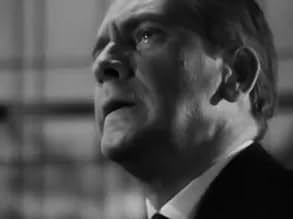PUNTUACIÓN EN IMDb
6,6/10
1,6 mil
TU PUNTUACIÓN
Añade un argumento en tu idiomaEpisodic look at the life of a minister and his family as they move from one parish to another.Episodic look at the life of a minister and his family as they move from one parish to another.Episodic look at the life of a minister and his family as they move from one parish to another.
- Dirección
- Guión
- Reparto principal
- Nominado para 1 premio Óscar
- 2 premios y 1 nominación en total
Dorothy Adams
- Woman Behind Hope at Baptism
- (sin acreditar)
Joan Anderson
- Child
- (sin acreditar)
Reseñas destacadas
Warner Bros. 1941 "One Foot in Heaven" was an inspired film. Based on a real person, William Spence, and adapted the from the biographic book by his son, Hartzel Spence, showed a truly rare individual who gave up his own medical ambition when he heard the call to serve as a Methodist minister. Directed by Irving Rapper, and with a musical score by Max Steiner, it was a crowd pleaser that continues to capture new friends, even today.
The success of the film lies on the fantastic portrayal of William Spence by Fredric March, who was at the height of his career. The character of Mr. Spence comes across as a no-nonsense man who must deal with the narrow mindedness of the small Iowa community he is sent to. Coming with his young wife, Mr. Spence was not prepared for what he would find in Laketon. The beautiful Hope, who came from another world feels inadequate in dealing with the church ladies who come to help her.
Mr. Spence gave his life to the town that didn't want any changes in their lives. When he proposed a new church to replace the older one, he meets the resistance of the elder moneyed classes. When they turn against him, they use every tactic, including slander to get him to his knees, but fortunately, he knew better. At the end, he was successful in giving the town what he envisioned was his contribution to the community where he spent his life.
Mr. March's performance is key that brings the action together. Lovely Martha Scott plays Hope Spence with dignity. The amazing supporting cast is wonderful. Gene Lockhart, Beulah Bondi, Moroni Olsen, and Grant Mitchell, among others do excellent job, something that was a hallmark of the Warner films of the time.
The success of the film lies on the fantastic portrayal of William Spence by Fredric March, who was at the height of his career. The character of Mr. Spence comes across as a no-nonsense man who must deal with the narrow mindedness of the small Iowa community he is sent to. Coming with his young wife, Mr. Spence was not prepared for what he would find in Laketon. The beautiful Hope, who came from another world feels inadequate in dealing with the church ladies who come to help her.
Mr. Spence gave his life to the town that didn't want any changes in their lives. When he proposed a new church to replace the older one, he meets the resistance of the elder moneyed classes. When they turn against him, they use every tactic, including slander to get him to his knees, but fortunately, he knew better. At the end, he was successful in giving the town what he envisioned was his contribution to the community where he spent his life.
Mr. March's performance is key that brings the action together. Lovely Martha Scott plays Hope Spence with dignity. The amazing supporting cast is wonderful. Gene Lockhart, Beulah Bondi, Moroni Olsen, and Grant Mitchell, among others do excellent job, something that was a hallmark of the Warner films of the time.
ONE FOOT IN HEAVEN is a wonderful story of what it takes to not only endure the difficulties in being a minister; but how these problems build character.
Year after year of allowing church bosses and bullies to dictate what will and won't be allowed, the minister finally learns how to beat them at their own game.
It has so many touches of warmth, in which a subliminal message of truth is going on coupled with hints of blackmail and leverage.
When Dr. Spence refuses to name his own son Wm. Spence, Jr. because he says, "Junior is a sissy name and I won't have my son being a sissy!" his wife decides to coerce him by holding back on the cooking of dinner until he gives in to her wishes. Thinking she's won, he says he'll name the baby in church next Sunday. As he asks for the name and she announces to the congregation, "William Spence, Junior," he repeats it as "William Frasier Spence" ("named after my grand old Scottish Uncle Frasier--and I don't mean the one who was hanged as a horse thief!")
It is this war of wills that carries the story; making each episode build to the next one. Tempered with touches of right and wrong, it is a classic! A must see! Good conflict, good story line.
Nominated for an Academy Award for Best Picture.
Year after year of allowing church bosses and bullies to dictate what will and won't be allowed, the minister finally learns how to beat them at their own game.
It has so many touches of warmth, in which a subliminal message of truth is going on coupled with hints of blackmail and leverage.
When Dr. Spence refuses to name his own son Wm. Spence, Jr. because he says, "Junior is a sissy name and I won't have my son being a sissy!" his wife decides to coerce him by holding back on the cooking of dinner until he gives in to her wishes. Thinking she's won, he says he'll name the baby in church next Sunday. As he asks for the name and she announces to the congregation, "William Spence, Junior," he repeats it as "William Frasier Spence" ("named after my grand old Scottish Uncle Frasier--and I don't mean the one who was hanged as a horse thief!")
It is this war of wills that carries the story; making each episode build to the next one. Tempered with touches of right and wrong, it is a classic! A must see! Good conflict, good story line.
Nominated for an Academy Award for Best Picture.
In a class I was taking we were assigned to watch this movie, and then, on paper, keep track of the conflicts that were found. I couldn't stop writing. It was one conflict after another.
I have just been moved to a new church, and though my problems were no where near what the pastor in the movie had to face, I learned a lot from it and I decided to share it with others.
We showed the movie at a Sunday Night service and it was well received and I recommend showing it to your churches. It generated a lot of laughter, especially the differences from then to today, but it also made many good points that hit home. I noticed a change in their attitudes the next day.
I have just been moved to a new church, and though my problems were no where near what the pastor in the movie had to face, I learned a lot from it and I decided to share it with others.
We showed the movie at a Sunday Night service and it was well received and I recommend showing it to your churches. It generated a lot of laughter, especially the differences from then to today, but it also made many good points that hit home. I noticed a change in their attitudes the next day.
This enduring classic is one of those films you can start at 12 midnight and watch all the way through without dozing off for a second. There are no dazzling special effects, no edge-of-your seat car chases or mid-air rescues.However,its engaging procession of honest scenes depicting the often overwhelming, though eventually rewarding, trials of a man of God during the first half of the twentieth century rival the greatest of superficial,high-tech thrills today's blockbusters have to offer. From the early scenes of Mrs.Spence trying valiantly to adjust to the squalor of her parsonages to Dr.Spence's creative solution to the adult choir's intolerable dissonance this film is a radiant beacon in a bleak world bereft with terrorism, wars, and rumors of wars due to its straightforward, heartfelt depiction of faith under fire. Though obviously filled with references to Methodist doctrine the film does not alienate members of other denominations and even nonbelievers can see this as an excellent example of how old-fashioned values triumph over hypocrisy and ignorance in turbulent times. Unfortunately, this movie is unbelievably rare and only pops up on TCM once in a blue moon. I
One Foot in Heaven is based on the memoirs of journalist Hartzell Spence's growing up as a Methodist preacher's kid in midwest USA from the Theodore Roosevelt era to the Roaring Twenties. It's what they mean when they talk about a family values film. The Camden Family of Seventh Heaven could well have been modeled on the Spence Family of generations past.
Young William Spence played by Fredric March has abandoned a career in medicine after being saved at a revival meeting and goes all the way and becomes a Methodist minister. Though taken aback by the career change, fiancé Martha Scott still marries him and the story follows them for the next 20 years or so, moving from one parish to another. Scott and March are such a good fit as the preacher and wife you would think that March was doing this with his own wife, Florence Eldridge.
March strikes just the right note as the minister, a just and pious man without being overbearing and sanctimonious. Would that preachers today were like him. He also demonstrates a capacity to learn. When his son goes to the silent cinema in defiance of Methodist preaching against the cinema, March takes him in hand to show him the error of his ways. They go to a William S. Hart western and March to his amazement finds he likes it and the western tale carries a good moral positive moral lesson. He changes his own view on the subject.
He also has to deal with a whole lot of modern day pharisees in dealing with the various politics of every parish he's assigned to. Chief among his tormentors are Beulah Bondi, the richest woman in town, who's actually offended by him treating her gardner Harry Davenport as an equal.
And there's Gene Lockhart who has something of the same role here as in Going My Way. But he's not as nice in this film. When he loses control of the church choir which Lockhart regarded as his private preserve, he and wife Laura Hope Crews mount a vicious smear campaign against March's son Frankie Thomas. His confrontation with Hope Crews and her gossip circle is a high point of the film.
Like Seventh Heaven there are some good humorous moments as well. I like March trolling for some marriage business down at the town clerk's office, looking for some wedding fees when times are a little lean. And the usual problems of dealing with parsonages which are not the most kept up buildings in the town.
The title of the film comes from March's explanation that he and his family have to set an example if in fact his profession puts them one foot in heaven already. It's good entertainment and Fredric March and Martha Scott do set the best example we'll ever see.
Young William Spence played by Fredric March has abandoned a career in medicine after being saved at a revival meeting and goes all the way and becomes a Methodist minister. Though taken aback by the career change, fiancé Martha Scott still marries him and the story follows them for the next 20 years or so, moving from one parish to another. Scott and March are such a good fit as the preacher and wife you would think that March was doing this with his own wife, Florence Eldridge.
March strikes just the right note as the minister, a just and pious man without being overbearing and sanctimonious. Would that preachers today were like him. He also demonstrates a capacity to learn. When his son goes to the silent cinema in defiance of Methodist preaching against the cinema, March takes him in hand to show him the error of his ways. They go to a William S. Hart western and March to his amazement finds he likes it and the western tale carries a good moral positive moral lesson. He changes his own view on the subject.
He also has to deal with a whole lot of modern day pharisees in dealing with the various politics of every parish he's assigned to. Chief among his tormentors are Beulah Bondi, the richest woman in town, who's actually offended by him treating her gardner Harry Davenport as an equal.
And there's Gene Lockhart who has something of the same role here as in Going My Way. But he's not as nice in this film. When he loses control of the church choir which Lockhart regarded as his private preserve, he and wife Laura Hope Crews mount a vicious smear campaign against March's son Frankie Thomas. His confrontation with Hope Crews and her gossip circle is a high point of the film.
Like Seventh Heaven there are some good humorous moments as well. I like March trolling for some marriage business down at the town clerk's office, looking for some wedding fees when times are a little lean. And the usual problems of dealing with parsonages which are not the most kept up buildings in the town.
The title of the film comes from March's explanation that he and his family have to set an example if in fact his profession puts them one foot in heaven already. It's good entertainment and Fredric March and Martha Scott do set the best example we'll ever see.
¿Sabías que...?
- CuriosidadesWilliam S. Hart was the guest of honor at the Hollywood premiere of this movie, since his movie The Silent Man (1917) figures prominently in the plot.
- PifiasAt the beginning of the movie, William Spence (Fredric March) announces he has been "called" to the church and will become a pastor in the Methodist Church. His soon-to-be mother-in-law, Mrs. Norris (Nana Bryant)), replies that she would have preferred that he'd joined the Episcopal Church. At that time, in Canada, the dominant church was the Church of England, not the Episcopal Church. That is predominantly a US institution born out of the American Revolution.
- Citas
William Spence: [to his son, Hartzell] A pastor's family are in a special category. We are uh... Well, It's as if we walked a sort of tightrope. Balancing with one foot on earth and one foot already in heaven.
- ConexionesEdited into Happy Times and Jolly Moments (1943)
- Banda sonoraThe Children's Prayer
(uncredited)
from "Hansel and Gretel"
Music by Engelbert Humperdinck
Libretto by Adelheid Wette
Sung by the Robert Mitchell Choir
Selecciones populares
Inicia sesión para calificar y añadir a tu lista para recibir recomendaciones personalizadas
Detalles
- Duración
- 1h 48min(108 min)
- Color
- Relación de aspecto
- 1.37 : 1
Contribuir a esta página
Sugerir un cambio o añadir el contenido que falta


